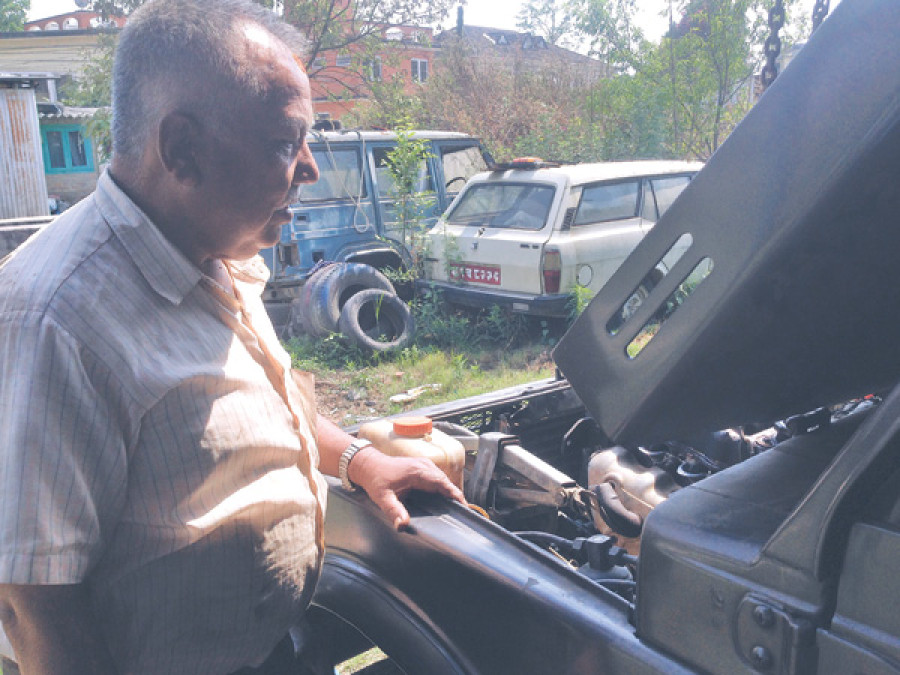Miscellaneous
The Tinkerman
As the automobile business in Kathmandu grows, fixing old cars is a dying business
Prateebha Tuladhar
Laxman Nakarmi, 72, has tinkered with simple machines for as long as he can remember. Hammer, pinchers, screw drivers, and wrenches were at his disposal as early as at the age of five. Orphaned early in life, Nakarmi offered himself as an apprentice to his uncle: Kulbahadur Nakarmi. He ran the Ford Garage in Lazimpat: the first workshop of its kind in Nepal, some 70 years ago.
But for the septuagenarian, whose entire life has revolved around cars, the last few years have been rather quiet as his business has experienced a lull.
“It’s easier to buy cars now. Companies offer two years of servicing for free. Also, there’s a growing trend of changing cars. No one really wants to keep an old one. It has dealt a blow to old carkhanas like us. Also, they have introduced computer software that detect glitches. You do not need humans to do it anymore.”
Moreover, the engines are constantly improving and so is the software. Laxman says it’s not a change a mechanic who doesn’t have an education and has learnt to fix things from trial and error could easily switch to.
He recalls his childhood as being filled with the noise of clanking of tools, combustion of engines and the smell of grease.“The Ford Garage was my only school: the only education I ever received.”
Nakarmi’s uncle, Kulbahadur Nakarmi, was the first man to receive a registered license from the government. “My uncle had worked at a railway station in Calcutta and had acquired driving skills. So, he got employed as King Tribhvan’s driver,” says Nakarmi. Kulbahadur not only became Laxman’s guardian, but also his teacher. At 12, the apprentice was fixing brakes on his own. At 18, he was fixing engines.
The garage in Lazimpat catered to the royalty—the only ones who owned cars at the time. Eventually, army officials and the embassies began seeking out the garage’s services as well.
“There were only so many cars. Most of them were carried into the valley on shoulders,” says Nakarmi. Watching cars go in and out of the garage, touching them while cleaning and fixing them, he felt as if the machines were his only friends. The garage was his home; there he slept, ate, fiddled with the tools and finally went to sleep, tired.
“There were only two vehicles in the Royal palace then. There was an Austin 10 and a Dough. It was King Mahendra who later sent for a Cadillac Lincoln by Ford.” There was more work to do after the Ranas started purchasing vehicles.
After 45 years of working under his uncle, Laxman started his own garage in Maharajganj, Chakrapath, with the Lazimpat garage closing after his uncle’s demise. Loyal to his good hand, many clients moved to the new location. Business was brisk. Laxman got married, had three children and struggled to make time for them.
“Most days I didn’t even have enough time to eat. My wife would bring me lunch and the tiffin-box would just have to wait while I dealt with the vehicles,” he says, looking around his garage, which no longer rumbles with the sound of engines, or the chatter of the mechanics and engineers. Business plummeted at Laxman Auto Works after the earthquakes. The blockade took further toll. And these are not the only factors.
“The death of King Birendra was ominous. The Maoist insurgency dented our business as the expats and the development workers couldn’t travel outside of the valley.”
Laxman Auto Works used to have around 30 employees, some of them were boys sent by their parents to ‘wean them away from bad habits’ and to see if they could find a job with one of the wealthy clients frequenting Laxman’s garage. A space that once came alive every morning with agile bodies chiming with the machines is now without any employees. Laxman’s sons, Nirmal and Gautam, are the only engineers at the garage now. And on a slow day—a hot May afternoon—the trio nap in their shed, waiting to hear the sound of a vehicle at the gate.
Dharma Khadgi, a dent painter, who now comes in as a part-timer after the lay-off, says there’s little to paint since old vehicles went out of fashion. “Nowadays, everyone drives new cars. There used to be a time people were deeply attached to their four-wheelers and would drive their grandfather’s car. But that doesn’t happen anymore.”
Hundreds graduated from Laxman’s workshop and set up their own business. Some went abroad, chasing dreams and more money, also creating a dearth of mechanics. The hustle-bustle that once filled the garage is now replaced by memories of what work used to be like.
“Although I took care of King Birendra’s car throughout his life, I only had the chance to see him a couple of times,” Laxman recalls painting the late King’s buggy for his wedding. The young groom had come to inspect it at the Ford garage in Lazimpat. He smiled at Laxman after surveying and said theek cha. When the erstwhile French President Francois Mitterrand visited Nepal in 1983, the Jaguar assigned for the visit wouldn’t start. Laxman was summoned to the durbar late at night. He fixed the engine by midnight and spent the rest of the night, with the driver, making four rounds of the Ring Road before they were sure the engine would not break down again. The next day, the French President smoothly cruised through Kathmandu.
These days, Laxman gets to touch a couple of vehicles a day if he’s lucky. Some days there isn’t a single one.
“These days, we only perform general servicing, which is to check the overall function. See if the engine belt, the engine oil, water, brake oil, oil filer, fuel filter are in order and to make a charge sheet indicating the next service date,” says Laxman.
Laxman Auto Works was once a technical training centre for Council for Technical Education and Vocational Training, Thimi, taking in a constant flow of interns who worked for three months. The garage has now shrunk into a weed-infested wasteland and the number of stray dogs that kept the workers company too has gone down to just one dog, who sits nodding under the awnings of the garage, half-waiting.
Laxman says it’s probably time he changed his business module and found something more feasible instead of paying a hefty rent for the garage space.
“Maybe we’ll take a smaller space and offer only car-wash services,” says Laxman, his voice slow and heavy now. Maybe his grandson, when he grows up, can help turn around the business into something more modern. “He’s already got a sack of toy cars. And when he sees a new model, he learns the name by heart. He reads the names when we’re on the road,” Laxman beams. “The love for cars runs in our blood. This is who we are.”




 9.12°C Kathmandu
9.12°C Kathmandu










